Jiahang Liu
TrackVLA++: Unleashing Reasoning and Memory Capabilities in VLA Models for Embodied Visual Tracking
Oct 08, 2025Abstract:Embodied Visual Tracking (EVT) is a fundamental ability that underpins practical applications, such as companion robots, guidance robots and service assistants, where continuously following moving targets is essential. Recent advances have enabled language-guided tracking in complex and unstructured scenes. However, existing approaches lack explicit spatial reasoning and effective temporal memory, causing failures under severe occlusions or in the presence of similar-looking distractors. To address these challenges, we present TrackVLA++, a novel Vision-Language-Action (VLA) model that enhances embodied visual tracking with two key modules, a spatial reasoning mechanism and a Target Identification Memory (TIM). The reasoning module introduces a Chain-of-Thought paradigm, termed Polar-CoT, which infers the target's relative position and encodes it as a compact polar-coordinate token for action prediction. Guided by these spatial priors, the TIM employs a gated update strategy to preserve long-horizon target memory, ensuring spatiotemporal consistency and mitigating target loss during extended occlusions. Extensive experiments show that TrackVLA++ achieves state-of-the-art performance on public benchmarks across both egocentric and multi-camera settings. On the challenging EVT-Bench DT split, TrackVLA++ surpasses the previous leading approach by 5.1 and 12, respectively. Furthermore, TrackVLA++ exhibits strong zero-shot generalization, enabling robust real-world tracking in dynamic and occluded scenarios.
TrackVLA: Embodied Visual Tracking in the Wild
May 29, 2025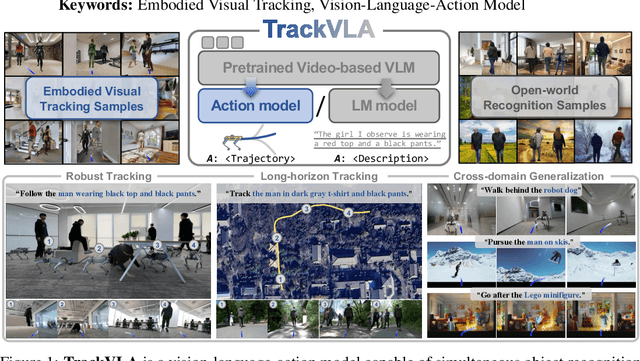

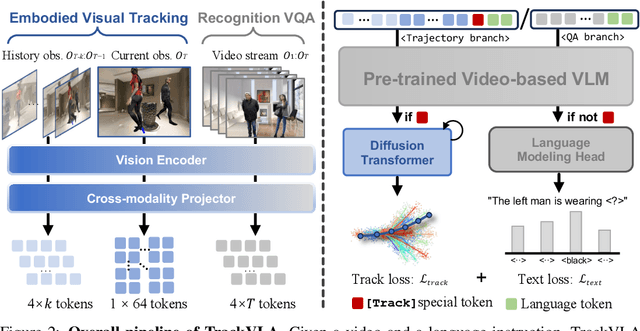
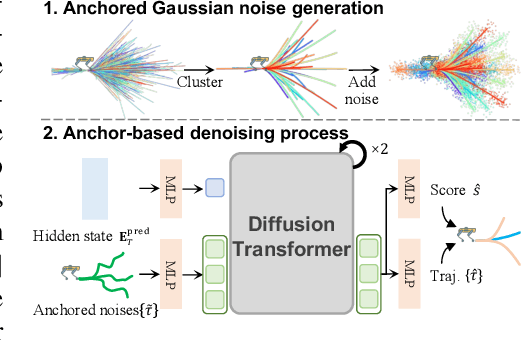
Abstract:Embodied visual tracking is a fundamental skill in Embodied AI, enabling an agent to follow a specific target in dynamic environments using only egocentric vision. This task is inherently challenging as it requires both accurate target recognition and effective trajectory planning under conditions of severe occlusion and high scene dynamics. Existing approaches typically address this challenge through a modular separation of recognition and planning. In this work, we propose TrackVLA, a Vision-Language-Action (VLA) model that learns the synergy between object recognition and trajectory planning. Leveraging a shared LLM backbone, we employ a language modeling head for recognition and an anchor-based diffusion model for trajectory planning. To train TrackVLA, we construct an Embodied Visual Tracking Benchmark (EVT-Bench) and collect diverse difficulty levels of recognition samples, resulting in a dataset of 1.7 million samples. Through extensive experiments in both synthetic and real-world environments, TrackVLA demonstrates SOTA performance and strong generalizability. It significantly outperforms existing methods on public benchmarks in a zero-shot manner while remaining robust to high dynamics and occlusion in real-world scenarios at 10 FPS inference speed. Our project page is: https://pku-epic.github.io/TrackVLA-web.
SizeGS: Size-aware Compression of 3D Gaussians with Hierarchical Mixed Precision Quantization
Dec 08, 2024
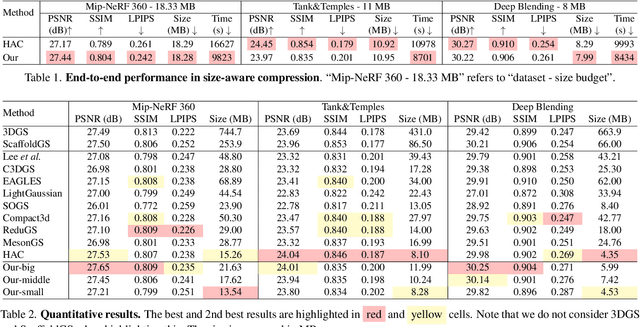
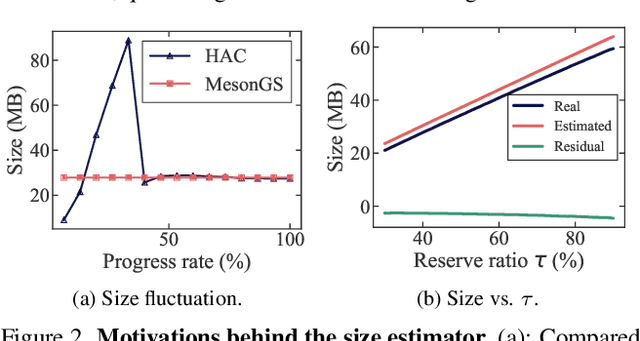
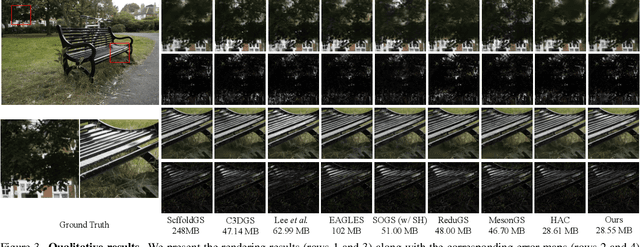
Abstract:Effective compression technology is crucial for 3DGS to adapt to varying storage and transmission conditions. However, existing methods fail to address size constraints while maintaining optimal quality. In this paper, we introduce SizeGS, a framework that compresses 3DGS within a specified size budget while optimizing visual quality. We start with a size estimator to establish a clear relationship between file size and hyperparameters. Leveraging this estimator, we incorporate mixed precision quantization (MPQ) into 3DGS attributes, structuring MPQ in two hierarchical level -- inter-attribute and intra-attribute -- to optimize visual quality under the size constraint. At the inter-attribute level, we assign bit-widths to each attribute channel by formulating the combinatorial optimization as a 0-1 integer linear program, which can be efficiently solved. At the intra-attribute level, we divide each attribute channel into blocks of vectors, quantizing each vector based on the optimal bit-width derived at the inter-attribute level. Dynamic programming determines block lengths. Using the size estimator and MPQ, we develop a calibrated algorithm to identify optimal hyperparameters in just 10 minutes, achieving a 1.69$\times$ efficiency increase with quality comparable to state-of-the-art methods.
Robot Learning in the Era of Foundation Models: A Survey
Nov 24, 2023Abstract:The proliferation of Large Language Models (LLMs) has s fueled a shift in robot learning from automation towards general embodied Artificial Intelligence (AI). Adopting foundation models together with traditional learning methods to robot learning has increasingly gained recent interest research community and showed potential for real-life application. However, there are few literatures comprehensively reviewing the relatively new technologies combined with robotics. The purpose of this review is to systematically assess the state-of-the-art foundation model techniques in the robot learning and to identify future potential areas. Specifically, we first summarized the technical evolution of robot learning and identified the necessary preliminary preparations for foundation models including the simulators, datasets, foundation model framework. In addition, we focused on the following four mainstream areas of robot learning including manipulation, navigation, planning, and reasoning and demonstrated how the foundation model techniques can be adopted in the above scenarios. Furthermore, critical issues which are neglected in the current literatures including robot hardware and software decoupling, dynamic data, generalization performance with the presence of human, etc. were discussed. This review highlights the state-of-the-art progress of foundation models in robot learning and future research should focus on multimodal interaction especially dynamics data, exclusive foundation models for robots, and AI alignment, etc.
Robust Learning-based Predictive Control for Constrained Nonlinear Systems
Nov 22, 2019



Abstract:The integration of machine learning methods and Model Predictive Control (MPC) has received increasing attention in recent years. In general, learning-based predictive control (LPC) is promising to build data-driven models and solve the online optimization problem with lower computational costs. However, the robustness of LPC is difficult to be guaranteed since there will be uncertainties due to function approximation used in machine learning algorithms. In this paper, a novel robust learning-based predictive control (r-LPC) scheme is proposed for constrained nonlinear systems with unknown dynamics. In r-LPC, the Koopman operator is used to form a global linear representation of the unknown dynamics, and an incremental actor-critic algorithm is presented for receding horizon optimization. To realize the satisfaction of system constraints, soft logarithmic barrier functions are designed within the learning predictive framework. The recursive feasibility and stability of the closed-loop system are discussed under the convergence arguments of the approximation algorithms adopted. Also, the robustness property of r-LPC is analyzed theoretically by taking into consideration the existence of perturbations on the controller due to possible approximation errors. Simulation results with the proposed learning control approach for the data-driven regulation of a Van der Pol oscillator system have been reported, including the comparisons with a classic MPC and an infinite-horizon Dual Heuristic Programming (DHP) algorithm. The results show that the r-LPC significantly outperforms the DHP algorithm in terms of control performance and can be comparative to the MPC in terms of regulating control as well as energy consumption. Moreover, its average computational cost is much smaller than that with the MPC in the adopted environment.
 Add to Chrome
Add to Chrome Add to Firefox
Add to Firefox Add to Edge
Add to Edge